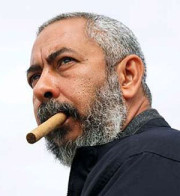A useless crime and collapsing illusions
I just finished reading Leonardo Padura’s tremendously disturbing novel, El hombre que amaba a los perros (click on link for my review), which is three stories in one: Leon (Lyev Davidovich) Trotsky’s final years, from his exile from the USSR in 1929 to his murder in Mexico in 1940; how an idealistic young Communist from Barcelona, Ramón Mercader, came to assassinate him; and how the story of this murder complicates and ultimately ruins the life of Iván, a Cuban born 10 years after the assassination who accidentally meets “the man who liked dogs” on a beach in Cuba.
The book is fascinating, and disturbing. In part because the life of Trotsky was so dramatic, even in exile, hounded by Stalin and his followers from country to country before finding refuge in Mexico. More disturbing is Padura’s very plausible imagining of how a young, extremely idealistic Communist from Barcelona could be transformed into a machine for one sole lethal purpose, denying himself any independent thought.
Padura’s Trotsky is difficult and overbearing, with an explosive temperament and razor-sharp sarcasm, but he is also a man of enormous courage and intelligence who maintains his dignity most of the time — his boy-like passion for Frida Kahlo being the most notable, and dangerous, lapse (risking his relations both with Diego Rivera and with his most important life-long comrade, his wife Natalia Sedova). In contrast, Mercader exhibits neither courage nor any independent intelligence (although he can learn languages). His anxiety to be accepted as a true Communist makes him manipulable to the point of murder— by his fanatical mother Caridad del Río, his equally fanatical girlfriend África de las Heras, and his NKVD handler “Kótov”.
But Padura goes beyond all that, through his Cuban narrator, the one-time fervent Communist revolutionary and promising author, now widowed and disbelieving of all larger projects, who sees this story of “one of the most ungodly, calculated and useless crimes in history” as a devastating critique of his own revolutionary idealism and the whole web of slogans and restrictions in socialist Cuba. And finally all his illusions, and more than his illusions, collapse upon him.
Padura borrowed the title from the story, “The Man Who Liked Dogs” by Raymond Chandler, a favorite author of the young Iván when he still aspired to create literature.
